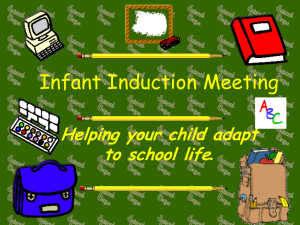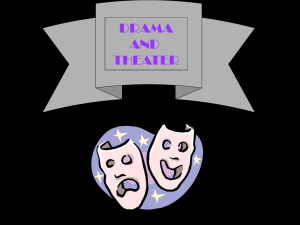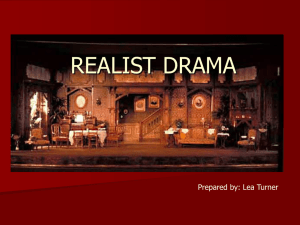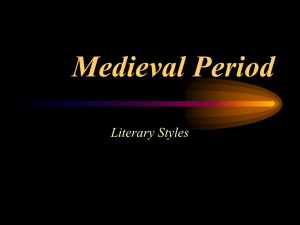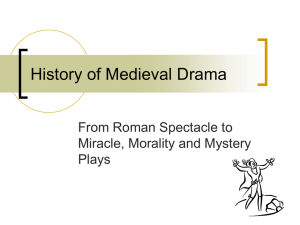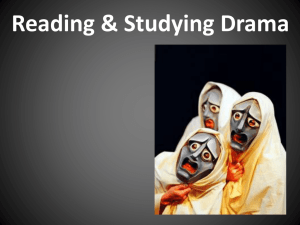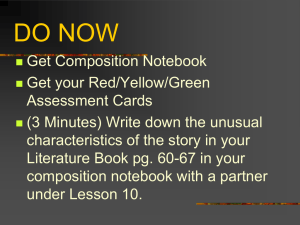Stage play - Verona School District
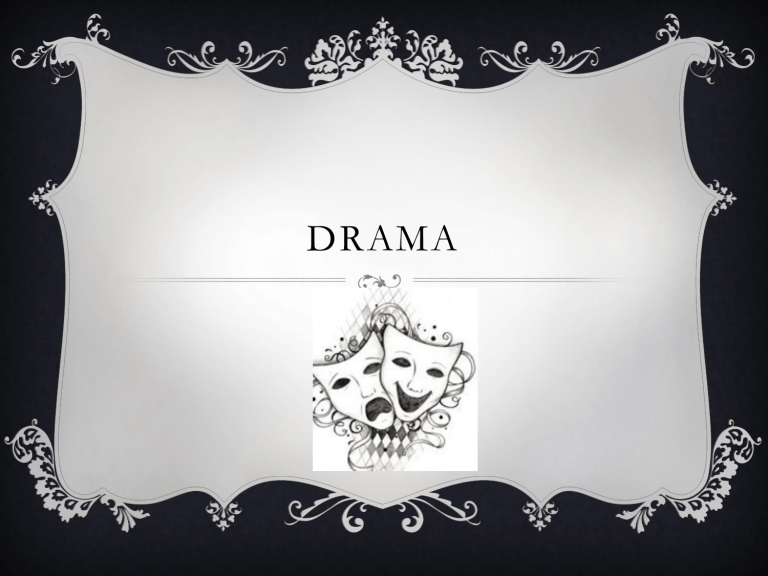
DRAMA
WHAT IS DRAMA?
Drama is different from other forms of literature because it is written to be performed.
• When you read drama, you should imagine that you see and hear the actions of a performance.
The term comes from a Greek word meaning "action"
Like other forms of literature drama includes:
• Characters people who take part in the action
• Conflict the problem between two characters or forces
• Theme the message or insight about life
ELEMENTS OF DRAMA
Although a drama is written for actors to perform, scripts can still be read or read in the form of a written version of a literary work.
A script is different from a short story or novel because a script is made up of dialogue and stage directions
KEY TERMS
Acts- often divided into parts called scenes
Dialogue- the term given to the words said by the characters. The characters lines are printed in the form of a play, called a script.
Protagonist- The main character, usually the ‘good guy’
Antagonist- The anti-protagonist, the one who causes the problems for the main characters
Cue - The words or actions at which an actor is expected to deliver a line or a crew member is expected to perform some task.
KEY TERMS (CONT.)
Stage Directions- are sets of bracketed information that tell what the stage looks like and how the characters should move and speak.
Set- is the construction on stage that suggest the time and place of the action
Props- the moveable items. Objects like a book suitcase or flashlights that the actors use to make their actions look realistic.
Fourth Wall- The imaginary fourth wall that is removed from box set to enable the audience to see the action on stage.
MORE KEY TERMS
Monologue– an extended speech by one character.
Soliloquy– an extended speech by one character, alone on stage.
• Soliloquies are used to express the private thoughts of one character.
Aside- refers to a speech or comment made by an actor directly to the audience about the action of the play or another character.
• The other characters are unaware of this action.
AFTER REVIEWING THE 5
ELEMENTS OF DRAMA
Why do you think stage directions are necessary in drama and not in stories or novels?
• Stories and novels develop by including descriptions and details.
These are elements which are not usually part of a drama.
• Stage directions describe how the setting will be displayed, props which are used and tell how actors look, move and speak
TYPES OF DRAMA
Drama describes a play that addresses a serious subject
Comedy is a form of drama with a happy ending. The humor often comes out of a characters’ dialogue and situation. Comedies can be written purely for entertainment but can also address a serious issue.
Tragedy is a form of drama in which events lead to the downfall of the main character. This character is often a person of great significance, like a king or a heroic figure
FORMAT
Screenplays scripts that produce movies
Teleplays are types of screenplays written for television.
Both include camera angles and require more variety of scene changes than a stage play.
Radio plays the written format of a radio broadcasts. They can include sound effects , but not lighting or staging instructions.
Stage play a drama written for a stage performance which includes all element of drama
Musical a play based on music
FORMATS?
The Hunger Games: Team
• Screenplay
Disney Icarly
• Teleplay
It is the 1940’s and there is no television! Your family tunes into “Radio 300 am” you are listening to a dramatized, purely acoustic performance, broadcast on radio
• Radio Plays
Romeo and Juliet
• Stage Play
Disney on Ice
• Musical or Stage Play on Ice
FORESHADOWING
Foreshadowing is a literary device in which a writer gives an advance hint of what is to come later in the story.
Foreshadowing often appears at the beginning of a story or a chapter and helps the reader develop expectations about the coming events in a story.
• Ex. The Outsiders The Socs jump Ponyboy while he walks home alone, previewing their later attack on him and Johnny; Johnny threatens to kill anybody who jumps him again, foreshadowing his murder of Bob.
WHAT DO YOU KNOW
ABOUT DRAMA?
Characters are involved in every literary work and most literary works involve conflict. Why is conflict an important part of drama?
• Conflict is an important element because it drives the action.
What examples of drama have you read, seen or have been part of?
• Was it comedy or tragedy?
• What was the conflict?
• What was the theme?

